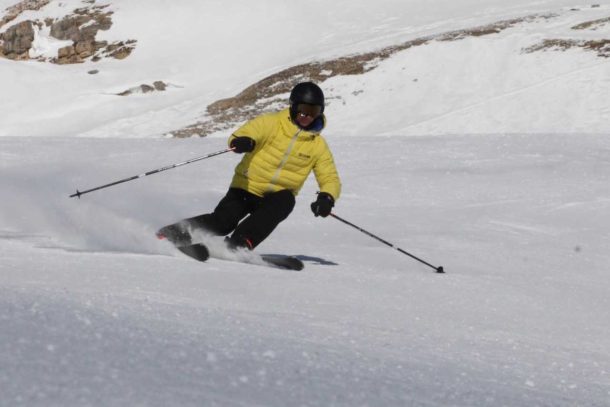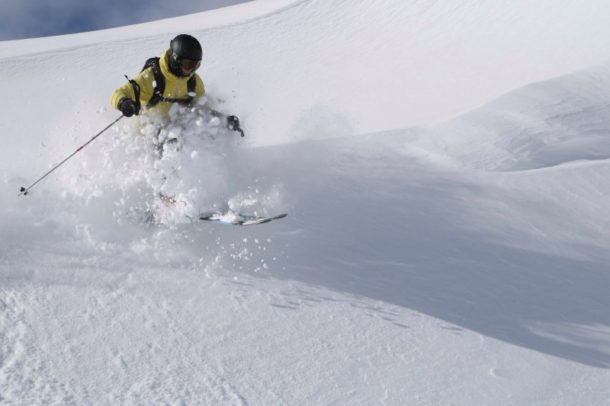
Are you planning a ski vacation but uncertain about whether to continue your running routine and adhere to your training plan? If you’re concerned about missing a week of training due to a few days of skiing, don’t worry! I’ll guide you on how to harmonize your ski holiday with your running training.
Contents
Skiing as a sport!
It strengthens the thighs!
Firstly, your ski week won’t completely derail your training. If you ski (or snowboard), you’re staying active, which offers numerous benefits. Skiing is akin to participating in strength training workouts that target the thighs. It engages muscles that are utilized in exercises such as squats and wall sits. Thus, you will be strengthening your thighs!
You work on anticipation
Additionally, if you’re into trail running, you likely understand that successful descending hinges on anticipation. Skiing, where you move faster than in running, requires even greater foresight regarding your paths and the movements of the terrain. I’m a prime example of this; having skied proficiently for several years, I found that when I began to take trail running seriously, descending became notably easier for me!
You oxygenate
Next, skiing increases your cardiovascular activity (though not to the point of reaching your maximum heart rate). Plus, being in the mountains and breathing the fresh air maximizes your oxygen intake. Clearly, you’re keeping active, so it’s hardly a setback for your training! Relax, a day spent sitting at a desk is far more detrimental to your running performance! Enjoying yourself also has significant psychological benefits. When you return, you’ll be devouring kilometers as if there’s no tomorrow! Understandably, with all the raclette you’ll likely indulge in, you might feel a bit heavier!

Ski vacation and running training: mission impossible?
Well, if you’re still keen to continue your training during your ski vacation, it’s definitely possible. Here are some tips to help you balance your ski holidays and running training effectively!
Easy runs
To stay motivated when you go for a run, consider planning short, easy jogs in the morning when your aerobic endurance is at its peak. This ensures you’re fresh and a morning run can really energize you! Be sure to wear a beanie and gloves to keep warm.
If running in the morning seems daunting, you can opt for a run at the end of the day instead. However, be aware that after a day of skiing, your legs might be tired or sore, and the cold might sap your energy, making it tough to get motivated for a run.
There’s no need to aim for long runs; 40 minutes to an hour should be enough. The main goal is to stretch out your legs and maintain your running habit. Additionally, finding a lengthy circuit in a ski resort might not be easy. You can still run on snowy paths, but make sure to wear trail running shoes with good grip and ideally, Gore-Tex to keep your feet dry.
Short interval training
You might also consider incorporating short interval training to add a bit of intensity to your runs. However, be cautious: if you plan to enjoy skiing all week, don’t overdo these workouts! The mountain air can be more taxing than you expect. For example, you could incorporate intervals such as 6×15 seconds of fast running towards the end of your run, with 45 seconds of recovery between each burst. Alternatively, you could try short hill repeats, perhaps 10×25 seconds each.
Keep in mind that you are likely at a higher altitude than your usual training environment. You may find yourself getting out of breath more quickly and feeling fatigued sooner—this is normal, as your body adjusts to the altitude. Don’t be concerned; training at higher altitudes can have several beneficial effects when you return to lower elevations.
Lastly, if you want to ski while optimizing your running training, consider choosing disciplines that are less costly in terms of lift tickets. For instance, you could try ski touring, which involves both uphill and downhill skiing without the need for lift access, or spend some time on the cross-country ski trails which often have a lower fee than alpine skiing areas!

Enjoying your ski holidays
Ski vacations and running training are not at all incompatible! In fact, you can enhance your experience by preparing effectively. To protect your joints and maximize your performance during your ski days, consider incorporating a few muscle-strengthening workouts starting a few weeks before your trip. You’ll notice a significant improvement on the slopes, and these workouts will be beneficial for your running training as well.
The primary risk associated with ski holidays in terms of running training is the potential for injury. While skiing supports the body, it also places unusual strains on the knees, which can lead to injuries that might interrupt your training plan. Therefore, it’s crucial to ski cautiously and mindfully to avoid any setbacks.
Additionally, it’s beneficial to know that spending time in the mountains leads to the development of more red blood cells in your body. This increase is crucial for the transportation of oxygen in your blood and to your muscles, enhancing your stamina and overall health. The positive effects of this change are particularly noticeable after about two weeks of stay at high altitudes.
With these insights, you now have all the keys to balance your ski vacations and running training successfully!